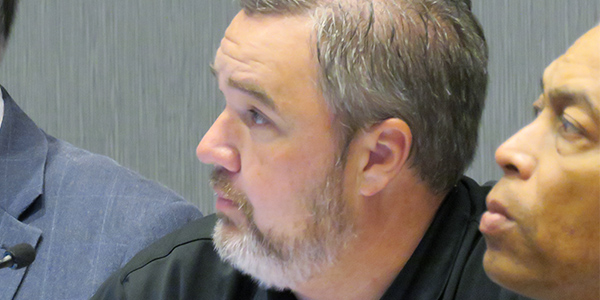SPP’s efforts to extend reliability coordination services to about 12% of the Western Interconnection’s load remains on a glide path, staff said this week during a pair of meetings with Western entities at Black Hills Energy’s offices in Rapid City, S.D.
The RTO is preparing for the start of shadow operations and a second certification visit by regulatory representatives in October. It plans to go live with RC services in the West on Dec. 3.
C.J. Brown, SPP’s director of system operations, told the Western Reliability Executive Committee on Wednesday that the grid operator is focused on closing issues identified by a Western Electricity Coordinating Council-led certification team’s August site visit. (See Certification Team Checks SPP’s Western RC Function.)
“Everything is on track,” he said.
The team did not find any “showstoppers,” Brown said, but left behind several issues it felt SPP needs to resolve before going live. Staff expect to close those issues by October and are on track to close about 40% of “recommended” issues before the certification team’s return visit on Oct. 9.
By then, SPP will have begun two months of shadow operations with Peak Reliability, WECC’s incumbent RC. Peak said in August 2018 it would wind down operations by the end of this year. SPP, CAISO RC Wins Most of the West.)
Shadow ops begin on Oct. 7, but SPP operators will begin staffing the RC desk on Sept. 25. A shadow ops model is expected to be in production on Oct. 1.
Brown said SPP staff have received a separate request from WECC, FERC and NERC staff to visit the RTO’s Arkansas headquarters in early November. The agencies conducted a similar visit to CAISO’s RC West.
“If it’s a good idea for California, it’s a good idea for SPP too,” Brown said.
Tri-State Generation and Transmission’s Keith Carman, chair of the WREC, offered words of praise for Peak employees, who have been working closely with staff from the incoming RCs.
“These employees have been nothing but professional, responsive, kind and receptive,” Carman said. “It’s way unexpected too, considering the predicament they’re in.”
RCs have been compared to top cops for transmission reliability across wide geographic areas. They are responsible for ensuring each member focuses on reliability, particularly across the seams from one area of responsibility to the next.
Brown also briefed the NERC Operating Committee on the RC transition last week, telling members said SPP “will be more proactive” in November before going live at noon MT on Dec. 3.
Staff Reconciling CAISO ICCP Data

SPP’s Yasser Bahbaz told the Western Reliability Working Group it has received more than 10,000 inter-control center communications protocol (ICCP) data points from CAISO as it works to stand up its western RC model. Staff is currently validating about 4,000 of those points, which changed from Peak’s model to CAISO’s.
“Someone made a change from an old name to a new name,” Bahbaz said. “We’re having to go one-by-one to reconcile.”
Brown said the CAISO model will become SPP’s primary model, with an earlier Peak model becoming secondary.
SPP has also downloaded Peak’s outage data into its systems and was to spend this week validating software applications with Peak’s balancing authorities. The RTO has already completed ICCP connectivity with its 13 RC customers.
SPP has ‘Good Handle’ on Reserve Sharing Groups
SPP is not concerned with “special circumstances” surrounding reserve sharing groups (RSGs) in the West, Brown told the WRWG. RSGs consist of two or more BAs that collectively maintain, allocate and supply operating reserves for use in recovering from contingencies within the group.
The Northwest Power Pool’s RSG has reserve requirements for the Western Area Power Administration’s Colorado and Missouri (WACM) region’s BA, while other WACM entities are part of the Southwest Reserve Sharing Group.
“I believe we have a good handle on the RSGs,” Brown said. “It’s pretty basic. We run one.”
SPP is working to receive contingency reserve data from the NWPP and Bonneville Power Authority RSGs. It plans to soon request the contingency reserve data for each BA within its RC footprint.
“We want to ensure every resource is covered by an RSG or a reserves requirement,” Brown said. “We just want to know how it’s done in the West. We want to understand the situation, so we have [it] accurately modeled.”
Brown said SPP would only issue energy emergency alerts in the West for reliability concerns. BAs will be responsible for meeting NERC’s BAL-002 requirements.
“We don’t expect anyone to shed load for a compliance violation,” he said.
WREC Approves Doc Modification Process
The WREC unanimously approved a modification oversight process (MOP) to manage document modifications related to the RTO’s Western RC services. The WRWG had been working to finalize the document since May.
The MOP applies to documentation established by SPP or SPP working groups that might affect operations or have a compliance or financial impact on its Western RC services customers. (See “SPP’s MOP ‘Cleans Up Stuff,’” SPP Western Reliability Briefs: Week of May 13, 2019.)
— Tom Kleckner






